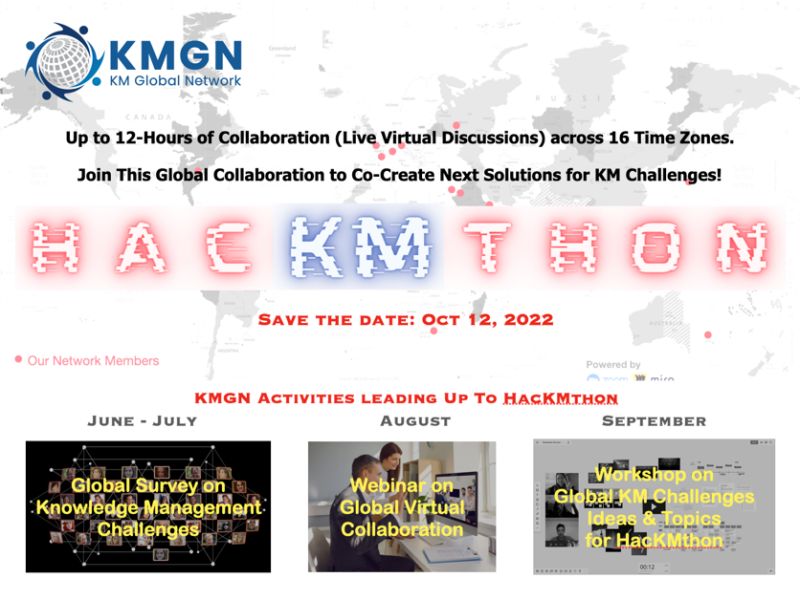Survey on Knowledge Management
Our partners from KMGN launched a survey to identify KM topics for the HacKMthon – October 12th 2022. Please participate – now (until June 15th).
Here are my 5 cent of contribution. Please add yours!

In your opinion, what are the key challenges for knowledge management today?
KM benefits from a clear definition. One is provided by ISO 30401 – but there are many different interpretations of knowledge and KM, which create misunderstanding, lack of clarity, room for tricksters and more trouble.
Knowledge – an asset in my interpretation – is difficult to describe and qualify. Tangible and intangible forms are differentiated, both are very hard to grasp as an inventory (description). Thus KM would benefit from visualization to show materiality.
Once knowledge is “more tangible”, it is still extremely tricky to measure. What are the costs for knowledge and what are value streams, what is the impact on the value of the organization? How can these valuations become more reliable?
Systematic application of knowledge in business models is the next challenge. How can the “amount of knowledge” added to a service or product be maximized to differentiate from competitors?
Related to the challenge of application are all logistical activities: insourcing knowledge (acquisition), sharing knowledge effectively internally and with partners, as well as segregating knowledge, once it is no longer valid. Getting the right knowledge to the proper context of the value creation process needs to be resolved by every organization.
Why do you think it is important to address these challenges?
A lack of definition regularly leads to endless discussions. In the larger context of an organization, there is a difference between individual learning and opinions, which are “free” in most developed contexts. On the other side are company standards or references which do not claim the status of “truth” but serve as working definitions and therefore lower transaction costs. High transaction costs imply lower productivity and thus lower competitiveness.
A similar argument applies to instruments and methods for resolving KM challenges. While many tools are available, e.g., for “mapping the mind”, it rarely matters which one is used. However, the purpose of such tools (e.g., for mind mapping) is drafting an idea or a concept. It does not support “all” other challenges. The same applies for valuation of knowledge assets: Intellectual Capital Statements or Integrated Reporting improve transparency and highlight priorities. Both are only starting the process-related challenges for KM. Learning about the pros and cons, the limitations of tools, is as important for KM as in any other corporate function. We need to make sure to develop and use the best available tools for KM.
Finally, we must focus our discussion time on the relevant challenges. While I agree with Peter Drucker’s “culture eats strategy for breakfast” that does not imply that we are allowed to stop a KM-discussion with the trivial statement: culture is important. YES it is, and now what? Let’s clarify on push-or-pull, on dealing with mistakes (blame shifting vs learning opportunities?), or opposition to executives – but only with regard to knowledge. Leave the rest to information management, quality management, or leadership as focal topics. If we talk about KM – let’s talk about KM!
Which of these challenges do you personally face in your professional work and/or organisation?
I see all these challenges daily and work hard to improve reliable methods to resolve them. If we consider KM a function in organizations, it must deliver with the same reliability as accounting or production. And we must become independent of the (random) talent of a gifted manager or consultant. KM must become reproduceable. ISO 30401 and DIN SPEC 91443 support this requirement, but only the beginning.
The combination of KM-related challenges to unresolved strategic issues and the now dominant challenge of change management creates a risk scenario for organizations and tests resilience. I frequently face a context where the “urgent” claims attention from the (strategically) “important”. While certainly not new, we, that is people caring for KM (= caring for productivity = sustainability), need to resolve this misallocation of resources!
In your opinion, what might be the key challenges for knowledge management in the next 5-7 years?
Aiming for the moon is fun, but most challenges I see have been well documented for more than 20 years. In my point of view, they will remain on the list.
There is, however, the additional topic of artificial intelligence, which will change our business models, the way we compete and thus, the economic context in a global dimension. This will happen faster and with more impact than most of us imagine. “Knowing” how to create an environment to use knowledge effectively in- and outside the organization remains a quest worth pursuing. Never mind the doomsday preachers of KM!
